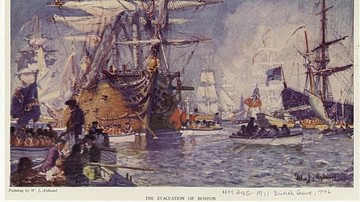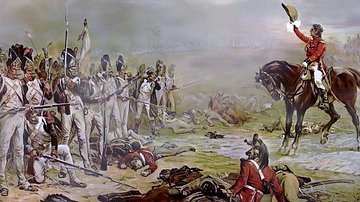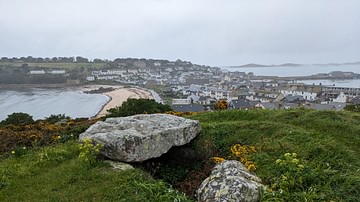Search
Search Results

Image
A. P. Hill
Portrait of Confederate General A. P. Hill (1825-1865), commander of the Third Corps of the Army of Northern Virginia during the American Civil War (1861-1865), photograph by Vannerson & Jones, circa 1861-65.

Definition
Goliad Massacre - Victory from Defeat
The Goliad Massacre (27 March 1836) was the execution of 350-400 Texians, of the garrison of Fort Defiance at Goliad, by the Mexican Army under orders from Mexican President and General Antonio López de Santa Anna (1794-1876). General José...

Article
Siege of Boston
The Siege of Boston (19 April 1775 to 17 March 1776) was the first major military operation of the American Revolutionary War (1775-1783). After the first shots were fired at the Battles of Lexington and Concord, American colonial militias...

Article
New York and New Jersey Campaign
The New York and New Jersey Campaign (3 July 1776 to 3 January 1777) was a pivotal campaign waged during the American Revolutionary War (1775-1783) for control of New York City, the Hudson River, and the resource-rich state of New Jersey...

Definition
Ancient Ireland
Ireland is an island country located in the North Atlantic, bounded by the North Channel, the Irish Sea, and St. George's Channel. It is known as Eire in the Gaelic language, which comes from the old Irish Eriu, the name of a daughter of...

Definition
Joseph Warren
Doctor Joseph Warren (1741-1775) was a physician from Boston, Massachusetts, who became an important political leader of the Patriot movement during the early years of the American Revolution (c. 1765-1789). Known for dispatching Paul Revere...

Definition
William Howe
Sir William Howe (1729-1814) was a British military officer and politician, most notable for his role as commander-in-chief of the British army during the initial years of the American Revolutionary War (1775-1783). Despite several significant...

Article
The Legend of Ticonderoga - A Famous Ghost Story
The Legend of Ticonderoga is among the most famous ghost stories of the last 200 years and remains a favorite among folklorists and, especially around Halloween, storytellers at seasonal events. Any summary or discussion of the plot would...

Image
Lord Hill Invites the Last Remnants of the French Imperial Guard to Surrender
General Roland Hill, 1st Viscount Hill asks the French Imperial Guard to surrender at the end of the Battle of Waterloo (18 June 1815); according to legend, a French officer replied, "The Guard dies, it does not surrender." Painting by Robert...

Image
Buzza Hill Entrance Grave
This large chambered cairn is found on Buzza Hill, a small hill south of Hugh Town on St. Mary's in the Isles of Scilly, UK. It was excavated in the 18th century by the Cornish antiquarian William Borlase, but nothing was found inside. The...